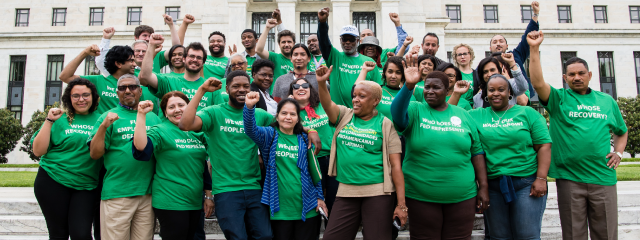Home Defenders Organize Around New "Underwater America" Report

This month, the Home Defenders League partnered with the Haas Institute for a Fair and Inclusive Society at UC Berkeley to promote a new academic study, “Underwater America: How the So-Called Housing ‘Recovery’ is Bypassing Many Communities.” The Home Defenders League is a membership organization of families affected by the housing crisis with 25 partner groups including the Center for Popular Democracy, Right to the City Alliance and Alliance for a Just Society and local groups like ACCE and Occupy Homes chapters.
The new report uncovers the depth of the housing problem that persists in many communities, as well as the extent to which the legacy of predatory lending has resulted in a disproportionate, negative impact on African American and Latino communities.
At the end of 2013 more than 9.8 million American households, representing 19.4% of all mortgaged homes, still owed more than the value of their homes. Underwater homeowners are significantly more likely to default on their mortgages than homeowners with positive equity.
The report recommends that loan holders should reduce the principal on underwater mortgages to their current market value. It also recommends that if loan holders are unwilling or unable to reduce principal then they should allow publicly owned or nonprofit entities to buy the loans to enable them to restructure them. The report further recommends that local municipalities should use all the tools at their disposal, including eminent domain, to reset mortgages to their current market values and to turn vacant homes into affordable housing.
An important and timely contribution to this issue, the report was covered well by national and local media outlets with articles in, among others, The Chicago Tribune, The Orlando Sentinel, The Milwaukee Journal Sentinel, The Hartford Courant, The Modesto Bee as well as coverage by Reuters. Several local broadcast television affiliates also picked up the story including San Francisco's CBS station and an Op-Ed by one of the report’s authors, Peter Drier, was published in the New York Times.












